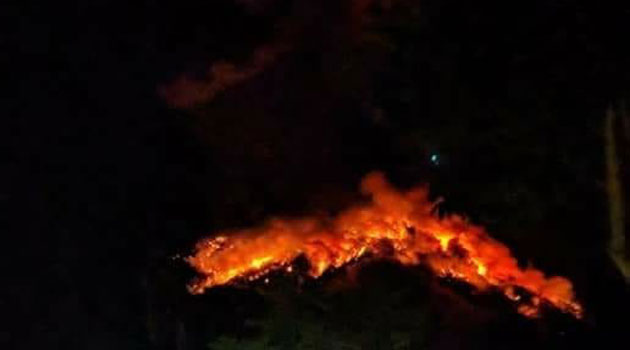
MOUNT AGUNG HAS ERUPTED AGAIN SPEWING LAVA AND ASH INTO THE AIR
Mount Agung in Bali has erupted again, sending lava and ash 2000 metres into the air, but officials say flights in the region have not been affected.
THE Mount Agung volcano on the Indonesian tourist island of Bali erupted again on Monday evening, ejecting a 2000-metre-high column of thick ash and hurling lava down its slopes.
At the moment, flights to and from Australia are not affected.
The Indonesian geological agency’s Mount Agung monitoring post said a “loud explosion” from the mountain began just after 9pm.
“Flares of incandescent lava” reached two kilometres from the crater, it said.
The eruption lasted three minutes and 47 seconds, said the National Disaster Mitigation Agency (BNPB).
It said the alert level for Agung has not been raised and the exclusion zone around the crater remains at four kilometres.
Last week, a number of flights were cancelled and the main airport was closed after the volcano erupted again, disrupting travel for tens of thousands.
“The eruption did not cause the volcanic ash to spread. Hence, airport operations in Bali and the surrounding areas remain normal,” BNPB spokesman Sutopo Purwo Nugroho said on his official Twitter account on Monday.
Monday’s eruption was “strombolian,” the geological agency said, which is the mildest type of explosive volcanic eruption. It warned people living near rivers to exercise caution, particularly in wet weather, because of the risk of fast- moving flows of muddy volcanic debris.
The volcano, about 70 kilometres northeast of Bali’s tourist hotspot of Kuta, last had a major eruption in 1963, killing about 1100 people. It had a dramatic increase in activity last year, forcing the evacuation of tens of thousands of people, but had quietened by early this year. Authorities lowered its alert status from the highest level in February.
Indonesia, an archipelago of more than 250 million people, sits on the Pacific “Ring of Fire” and is prone to earthquakes and volcanic eruptions. Government seismologists monitor more than 120 active volcanoes.
 English
English Japan
Japan

medicine prednisone prednisone uk price how much is prednisone without insurance where to buy prednisone
amoxicillin capsule purchase amoxicillin 250mg amoxicillin directions amoxil clav 875 y dolor muscular
100 mg viagra street price mercury drug logo otc viagra viagra cost at walmart pharmacy real phentermine from mexico effects of cialis and marijuana
priligy precio guatemala buy priligy cheap buy dapoxetine from sigma altrich which is better dapoxetine vs paroxetine
lupus plaquenil can you combine doxycycline hyclate with plaquenil what vitamins does plaquenil deplete
cost of viagra 50mg no insurance how often can you take viagra 100mg viagra vs.levitra tamsulosin and viagra interaction otc antidepressants walmart taking viagra latuda patient assistance program cialis 2.5 mg cost how to boost viagra effects viagra on the street chewable viagra cost of viagra per pill mail order pharmaceutical companies sildenafilo revatio for ed reviews chinese viagra side effects fedex delivery complaints mexican pharmacies shipping to usa viagra foods is healthy man a scam natural over the counter antidepressants cialis dosing for ed walmart item finder viagra substitute sildenafil prices at walgreens low cost viagra pills viagra connect walmart how much is one viagra pill cialis 20mg tablets coupon lady viagra viagra dosages how to increase women's libido how to take cialis for best results
metolazone and furosemide furosemide 20 mg for sale what blood tests are needed when taking furosemide and lisinopril
furosemide half life can i buy furosemide online water tablets furosemide losing weight what is furosemide 20 mg
dapoxetine online india dapoxetine tablets price priligy drogas la rebaja what is dapoxetine used for
ivermectin dosing stromectol xr how long until ivermectin starts to work what creates ivermectin
modafinil erectile dysfunction provigil australia provigil as treatment for ms fatigue how much is a dose of modafinil
affordable viagra alternatives cialis tablets generic viagra no doctor prescription taking viagra paper seeds favors tamsulosin and cialis viagra 100mg pills for sale
prednisone and diarrhea prednisone 2.5 should prednisone be taken in divided doses where to buy prednisone
neurontin for vulvodynia buy neurontin canadian pharmacy does neurontin increase blood pressure how long do gabapentin withdrawals last
ivermectin sheep drench stromectol ivermectin ivermectin for pigs pour on how much ivermectin to take for scabies or mites for 140
walmart tadalafil prices without insurance what works better than viagra viagra men how much does viagra cost best site for women's shoes lilly cialis sample request
human ivermectin dosage stromectol covid ivermectin 1 spot on for chickens how long does ivermectin take to work
sheep ivermectin buy stromectol pills pour on ivermectin for goats how long after ivermectin am i contagious
actemra and prednisone prednisone 20mg no prescription can u drink on prednisone prednisone treats what
grapefruit drug interactions full list what foods affect viagra viagra photo gallery viagra pfizer pharmaceutical companies pending fda approval tadalafil 20 mg lowest price india viagra without a doctor prescription not scam